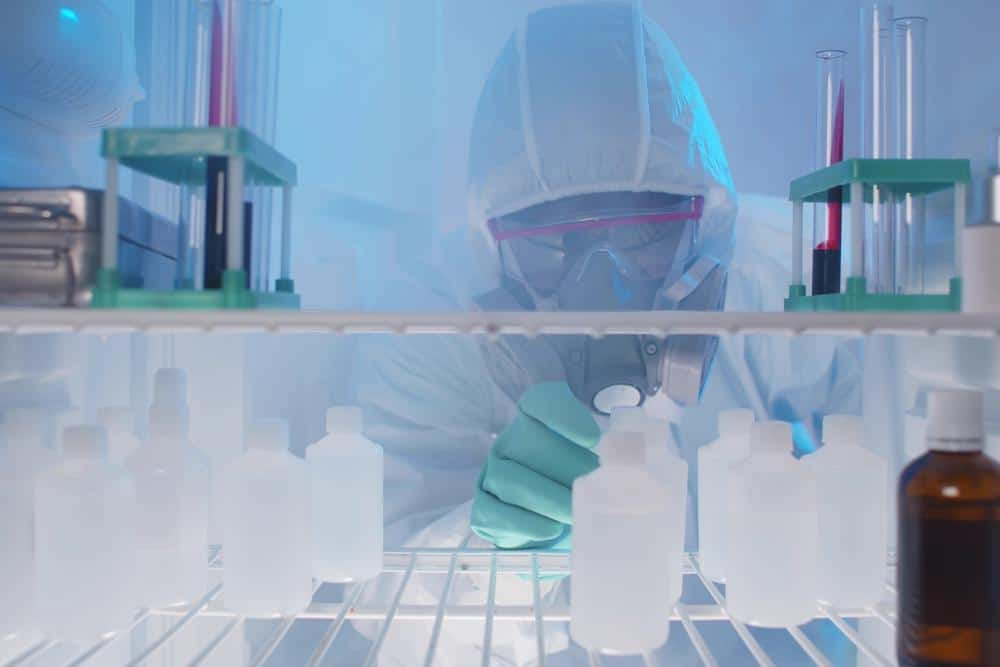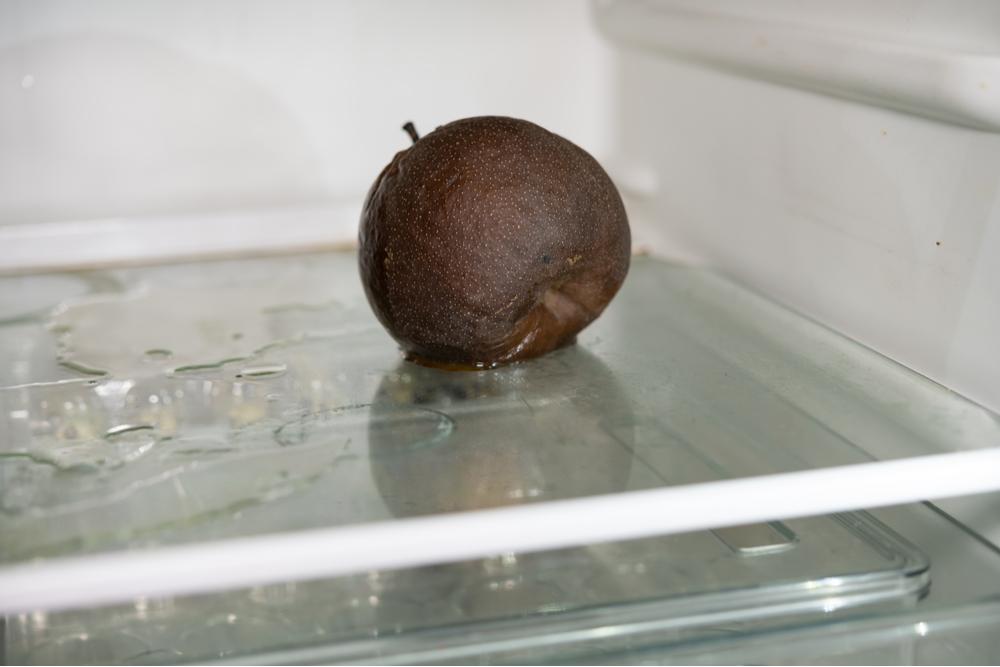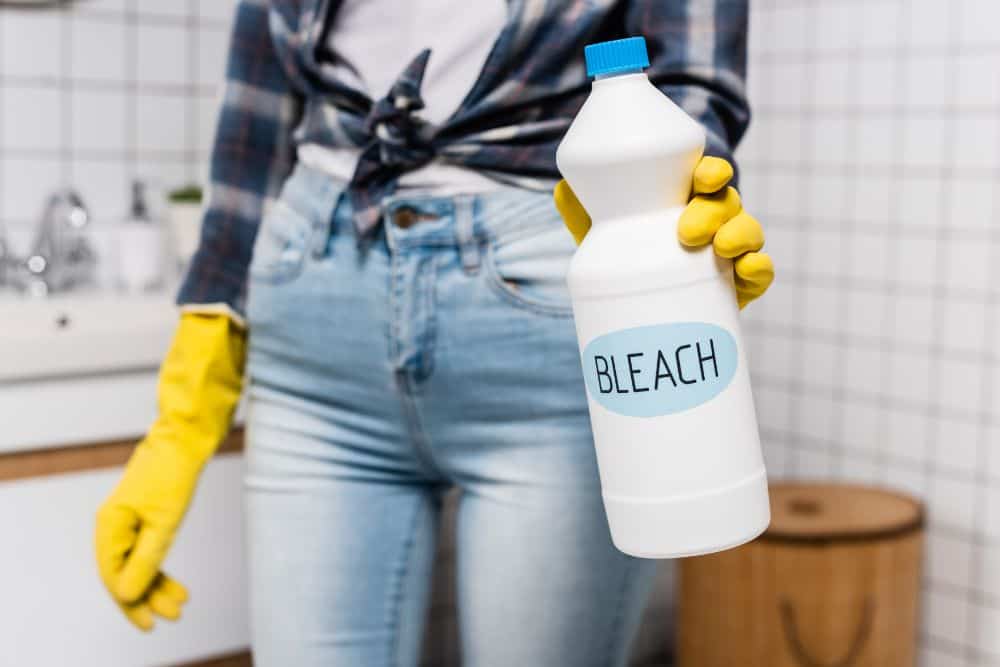Your fridge’s job is to keep food fresh and tasty. What do you do if your fridge isn’t doing its job? Have you noticed a weird smell or even a chemical taste in the food that is in there?
Are you wondering “why does the food in my fridge taste like chemicals?” It’s not just unpleasant to eat food that has a weird taste-it can be dangerous to your health too!

You don’t want to feel like you need to wear a hazmat suit when you open the fridge
There are many reasons why the food in your fridge might taste like chemicals. Some of the reasons are harmless, while others are more dangerous, so it’s crucial to diagnose the issue quickly and find a solution.
I’ve experienced the issue before, and I was relieved when I discovered that the solution to the problem was something I could do myself! Some of the issues associated with fridge smell are easy to fix, while others will require an expert.
Paying Special Attention to Your Ice Tray and Putting Some Baking Soda in Your Fridge Can be Great First Steps to Avoiding That Awful Taste
In this article, we’ll take a look at the reasons for fridge smell, why your fridge might be making your food taste like chemicals, and provide some tips on what to do to fix the problem.
It’s possible that your food doesn’t taste like chemicals but that your fridge has a strong chemical smell.
If your fridge smells like chemicals, it won’t be long until the food starts to taste the same way. Food and water are absorbent when it comes to odor, and because the refrigerator is a sealed environment, the only place the odor has to go is into the food.
Once food absorbs odor, it’ll start to taste like the odor it developed. Sometimes, the food molecules may even interact with the odor to create a different smell or taste.

Baking Soda is Extremely Affective at Absorbing Bad Odors
Below are the most common reasons fruit and other food items take on a chemical taste.
You’ll probably be surprised to learn about this harmless but common cause of chemical fridge smell and taste. Rotten citrus is a common cause for a foul odor in your refrigerator. Luckily, it is incredibly easy to fix.
If you keep your citrus fruit in the refrigerator (or if you keep cut up or half-used sections of citrus in the fridge), it can cause a strong, permeating odor that sometimes smells like chemicals if it permeates the space.

Rotting fruit or other food can affect the taste of other items in the refrigerator
Rotting citrus produces a distinct, usually bitter smell. It makes such an odor because the mold spores that are released into the air carry with them the essential oil of the citrus peel.
Homeowners can easily mistake the smell of citrus essential oil for a chemical smell. Rotting citrus also produces alcohol, which gives off a pungent, chemical odor.
If you determine that spoiled food (including old fruit) is the cause of your chemical taste, remove any spoiled citrus from your fridge and air it out if you can.
If you decide to air out your fridge, you’ll need to turn the unit off and find another location to store your food for as long as it takes the smell to disappear.
If airing it out is not an option, try putting a box of baking soda in there for a week or so to absorb any residual smell. You may also want to try keeping your citrus outside the fridge.
Citrus doesn’t need to be refrigerated, and it looks charming when kept in a decorative fruit bowl. Why not keep your citrus on the counter in a bowl instead of in the fridge? It adds a neat look to the kitchen, and you will be more likely to notice when it starts to expire.
If you do store food in your refrigerator, be sure to keep the food in an airtight container. This will contain any bad smell that may be coming from your food and preserve the quality and flavor of your food by keeping it from drying out or absorbing other smells present in your fridge.

Leaking Refrigerant Can Cause Serious Health Issues - Be Sure to Call an Appliance Repair Pro to Address any Issues Related to Refrigerant
Leaky refrigerator coolant is another common cause of chemical taste in food. Freon is a refrigerant used in refrigerators. It is a liquid that circulates through metal tubes in your fridge and transfers heat out. Put simply: freon is a refrigerant that keeps your fridge cool.
Freon is mostly odorless, but it sometimes gives off a strong chemical smell. The smell might be similar to acetone (nail polish remover) or ammonia (often found in cleaning agents.) Other signs of leaky coolant include a puddle of oil under the fridge, a fridge motor that never turns off, or a warm fridge.
Freon is harmful if you breathe it in. It’s crucial to get this problem resolved as quickly as possible. Regularly inhaling large quantities of freon can cause breathing difficulty, fluid buildup in the lungs, organ damage, and even sudden death. This is called refrigerant poisoning.
Because freon is difficult to detect, you should act quickly if you suspect that it’s causing your refrigerator’s chemical smell.
If you suspect you have a coolant leak, call a home appliance repair specialist or a refrigerator repair specialist. Coolant systems are sensitive and can be difficult to fix. I don’t recommend trying to fix this problem yourself.
It may also be good to leave your home for a few days until the leak is fixed. Take family members and any pets, including fish, with you.
If your refrigerator has too much moisture inside of it, it may lead to a horrible musty smell. This is especially true if your refrigerator has been unplugged for an extended period of time and is allowed to reach close to room temperature. You may run into an issue like this after an extended power outage.
 Too much moisture and a warm fridge can produce a musty smell and taste to food
Too much moisture and a warm fridge can produce a musty smell and taste to food
It's time to clean the fridge. Take out all the shelves, and drawers and wash them with hot soapy water. Wash the inside of the refrigerator as well.
To further reduce the chances of the musty smell returning, you can use a mixture of a tablespoon of bleach with a gallon of water to wash the inside of the fridge and all the drawers and shelves. You'll want to do this after you've already wiped everything down with the hot soapy water.
Once you're done wiping down the fridge, be sure to dry all surfaces with a clean towel when done.

Don't Use Cleaners with Bleach on Your Fridge as It Can Leave a Strong Smell Behind
If you use chemical cleaners to clean your fridge, you may inadvertently be causing the chemical smell and taste yourself! Refrigerator interiors are lined with plastic, which absorbs odors and chemicals surprisingly well.
When you clean the inside of your fridge with strong chemical cleaners, the plastic can absorb the cleaners' scent. Lemon-scented cleaners especially can leave behind a smell in the plastic. These odors can permeate through the rest of the refrigerator, and the food will eventually absorb them.
If you believe a cleaner is a reason for your chemical taste, the best thing to do is air out your fridge. You can also try baking soda, as mentioned above, or activated charcoal to absorb the odor. Activated charcoal is not the same as the briquettes you would put on a barbecue. It’s available in drug stores or pet stores.
To use activated charcoal, spread the charcoal in a shallow pan and place it in the bottom of the fridge. The charcoal will lose its effectiveness eventually, but you can heat it in the oven on low heat for an hour or so to rejuvenate it.
You might also consider using a different cleaning agent for your fridge. Some cleaning agents like ammonia and bleach can damage the interior lining of your refrigerator.
Others, as seen above, can leave a lingering chemical odor.
Try using a baking soda and warm water solution to clean the inside of your fridge. I recommend a tablespoon of baking soda to one quart of warm water. Other good at-home cleaning products for fridges include lemon juice and white vinegar.
